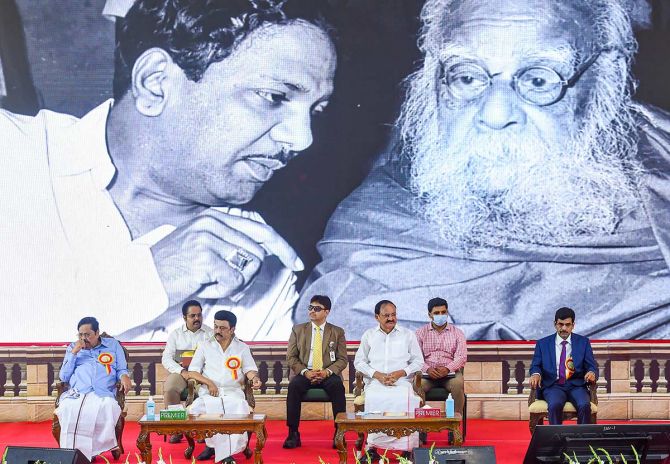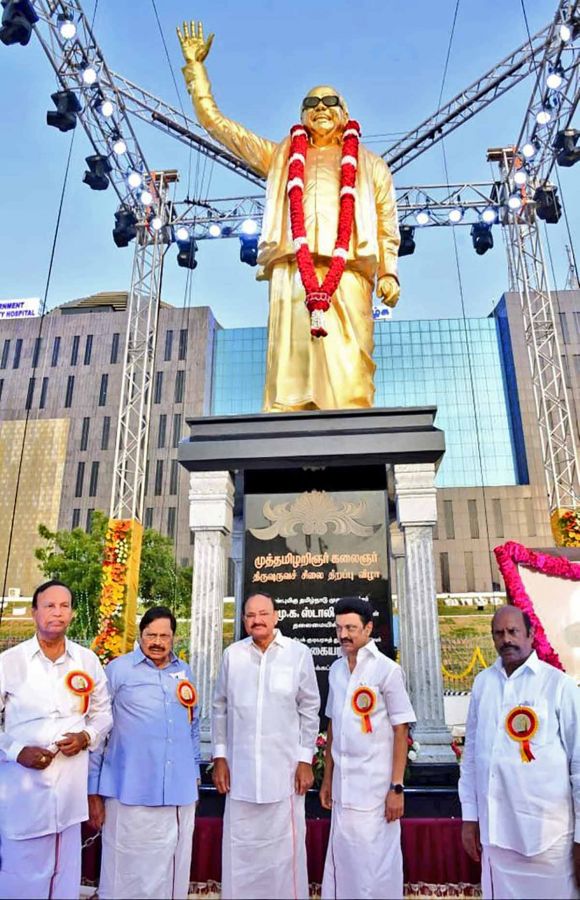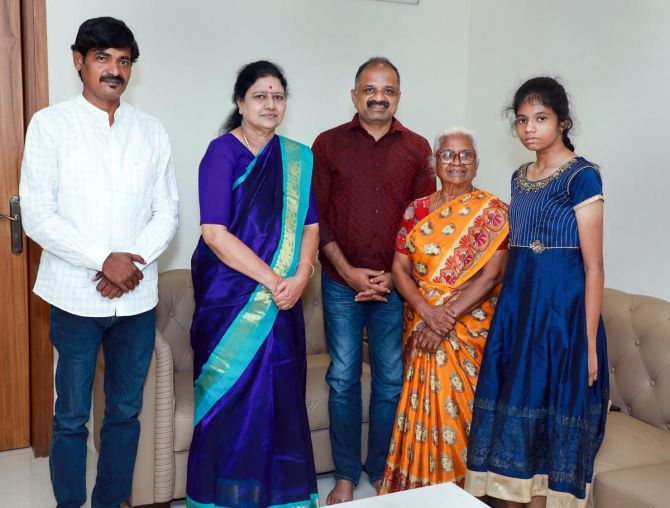Hindutva social media continues to present the DMK as anti-god, anti-Hindu and anti-Brahmin.
The strategy did not work in the past, it has not worked in the present, and won't work in the future, predicts N Sathiya Moorthy.

Tamil Nadu Chief Minister M K Stalin and Union Minister of State for Fisheries, Animal Husbandry and Diaries L Murugan are also seen. Photograph: ANI Photo
Only hours after Prime Minister Narendra Modi had eulogised the Tamil language and the Tamil people at a massive public rally in Chennai, state Bharatiya Janata Party chief K Annamalai almost left it all out in his news briefing.
Instead, he targeted Chief Minister M K Stalin for 'politicising' the official function in which the prime minister had unveiled Rs 31,530 crore (Rs 315.30 billion) centrally-funded projects for the state, by reading out a long list of the state's demands for Modi's knowledge.
The demands included full reimbursements of GST dues, Presidential assent for the 'NEET exemption bill' and the 'retrieval' of Katchathivu from Sri Lanka's ownership and possession as this is the 'right time'.
A week and more later, people remember the war-of-words between the state BJP and Dravida Munnetra Kazhagam leaders, and not a word of the prime minister's speech, which Annamalai said was development-centric'.
DMK spokespersons have claimed that Stalin was only airing the state's grievances, and what better place could be there than the PM's public rally that all the people saw on television news.
According to the DMK leaders, such a strategy was neither new nor could have been avoided as all previous pleas by the state government and the ruling party to the Centre and central leadership had fallen on deaf ears.
Of course, the DMK and the state dispensation refer to the Centre only as the 'Union government', or 'onriya arasu' in Tamil, as mentioned in the Constitution.
Likewise, unlike what Annamalai may want the state to believe, Modi's references to the Tamil language were all politics, pure and simple, not development-centric.
That should cancel out his charge that Modi was talking development, and Stalin was politicising it all.
In a way, Modi's programme too was politics-driven, to take his 'development message' to 'Dravidian' Tamil Nadu, where the state BJP is tasked with increasing the party's visibility, presence and hoped-for dominance in the long run-up to the Lok Sabha elections of 2024, followed by the state assembly polls two years later.
Between them, Annamalai, the state BJP's IT cell and the Hindutva segments of social media are all doing a fine job of it all -- but there is a flaw, all the same.
First and foremost, the Hindutva social media continues to present the DMK especially as anti-god, anti-Hindu and anti-Brahmin.
The strategy did not work in the past, it has not worked in the present, and would not work in the future, as a massive vote-getter.
The previous generation did not care, the present and future generations have no clue about what is being talked about.

With the result, the BJP's core constituency is confined mostly to 2-3 per cent of Brahmin/Brahminical voters, and is unable to come out of the entrenched mindset despite large-scale induction of non-Brahmin, and even non-RSS leaders like Annamalai, and successful attempts at broad-basing the caste component in the party's reach and outreach in the Dravidian state.
Then, there is Modi's development agenda, which does not sell any more in Tami Nadu.
In particular, the local populace, cutting across party lines, acknowledge that most of the centrally sponsored social sector schemes, whichever party or leader was/is in power in New Delhi, they had all been carbon copies of state government schemes, be it under the DMK or the AIADMK.
On the contrary now, unacknowledged by most commentators -- that is, if they had known and felt it -- the local media coverage of the economic crisis in neighbouring Sri Lanka has sent down the 'fear of the unknown' across the narrow Palk Strait, down the spines of the common man in Tamil Nadu.
He sees the Annamalai-led state BJP protest for the DMK government to reduce VAT on petrol and diesel, in line with the Centre's recent duty cuts, only as a diversionary tactic, to cover up multiple problems facing the common man owing to what they perceive as the Modi government's wrong policies over the past eight years.
The message of the BJP protest, if any, has failed to register.

Even Modi's constant references to Tamil couplets in international fora like the UN in the past, and speaking of the greatness of the Tamil language in Chennai recently, does not register with non-conformist BJP voters any which way.
As the old adage goes, it is as if Modi and other BJP central leaders are 'selling coal to Newcastle' when the job on hand is to 'market refrigerators to an Eskimo'.
Because electoral politics came to them early as the region was a part of the Madras Presidency, and the Justice Party ancestor of the domineering DMK-AIADMK came to elected office as far back as 1920, full 17 years before the Indian National Congress replaced it and for good, the average Tamil is not interested in language-centric antics, either of their own politicians or those from the North.
To him, it is much different from 'Hindi imposition'.
It was so even in the days of Indira Gandhi, who took on from her father Jawaharlal Nehru, to dress and dance like the locals, wherever they went, for the whole nation to see in newspaper photographs and the I&B ministry's 'news reels' that preceded popular film in cinema halls across the country, those days.
It does not sell in the state, and political Delhi has still not understood this basic premise.
In her time, with no tele-prompter to aid, Indira Gandhi used to begin her public addresses in the state with 'Vanakkam' for an opening greeting in Tamil and used to end her election speeches with a 'Nandri', or 'Thank you'.
In these hi-tech days, leaders like Modi are able to read out a few more lines in Tamil to the local audience, where only party cadres cheer. Others, including those on the dais, wear their boredom on the face.
The more important aspect of this pro-Tamil, as different from pan-Tamil politics, is two-fold.
One, it relates to a sense of being Tamil, independent of political affiliations and electoral campaigns.
Here, issues like the Jallikattu protests matter the most.
The contemporary scene continues to include the Cauvery water dispute involving Karnataka, the Mullaperiyar case with Kerala and the the Sri Lankan fishing issue, all of them centred on livelihood concerns, but packaged in emotional tones.
Even the controversial Koodankulam protests against the atomic power plant had a livelihood element flowing from possible denial of fishing and anticipated loss of catch in the adjacent seas.
On the river water disputes, the ruling party at the Centre, whether the Congress earlier or the BJP since, end up having to take different lines in Tamil Nadu, and in the other stake-holder state.
For instance, Annamalai's detractors even in the state BJP -- and there are many -- are now waiting for his turn to duck in when detractors refer to the BJP-ruled Karnataka resolving to go ahead with the Mekedatu reservoir project across the Cauvery, which every party and government in Tamil Nadu has opposed without a second thought.
On another count, state BJP veterans blame the central leadership for a part of their plight over three decades now.
As they point out, like the Congress high command post-1967, the BJP leadership too goes by 'national compulsions', which translates as seeking Dravidian political support, pre-poll rather than post-poll, alliance.
It began in the 1990s, when the Atal Bihari Vajpayee-L K Advani duo tied up with the AIADMK and the DMK, one after the other, in the Lok Sabha polls of 1998 and 1999, respectively.
Though the BJP has a substantial majority in the Lok Sabha, a strong leader in Modi and a poll strategist in Home Minister Amit Shah, the party is obsessed with the idea of a 'Congress mukt' Bharat.
In Elections 2019, the Congress won the single largest pool of nine MPs in a total of 52 in the country, as a partner in the DMK-led alliance.
The party has 18 MLAs in the state, again in the company of the DMK, which came to power in 2021, after a decade-long break.
What more, the Congress has a higher vote share than the BJP, and all of it is 'transferrable' to the DMK and its Socialist allies.
The BJP has got 'transferrable votes' only for the AIADMK, and not for the DMK, owing to the latter's 'anti-Hindu, anti-god and anti-Brahmin' politics.
Yet, the BJP's central leadership is said to be still keen on breaking the DMK-Congress alliance even though it is now convinced that its own traditional support base won't relish an alliance with the DMK.
Yet, state party leaders like Annamalai are openly campaigning that it's going to be 'DMK versus BJP' in Tamil Nadu.
BJP leaders before him had said this openly whenever the DMK is in power -- but do not want to hurt the rival AIADMK, their trusted ally, whenever that party is in power in the state.

Some of that inter-party confusion in the state BJP may have to end sooner than later.
Obviously piqued at the denial of a Rajya Sabha seat just now, 80-year-old AIADMK veteran C Ponnaiyan has since begun targeting the party leadership for letting the BJP ally grew at its expense. He may have a point, unconnected to the BJP alliance.
In targeting the BJP, Ponnaiyan has called the BJP anti-Tamil and against Tamil Nadu's interests.
This criticism assumes significance after Modi's pro-Tamil talk, followed the next day by Vice President M Venkaiah Naidu, who was on to unveil a 16-foot Karunanidhi statue in the heart of the city.
Tied down to the intra-party squabble between former chief minister Edappadi K Palaniswami (EPS) and ex-deputy CM O Panneerselvam (OPS), the AIADMK is not fighting fit to take on the DMK -- whose administrative slip-ups have begun showing -- as aggressively as Team Annamalai, if not the state BJP as a party.
While the AIADMK may be tempted to initiate disciplinary action against the had-been aide of party founder, the late M G Ramachandran, Ponnaiyan's may be the voice of second-line leaders and more so the cadres, who are getting increasingly frustrated at the unfought internal feud.
Some of them go as far as to suggest in private that it would be better for OPS and EPS, respectively the party coordinator and joint coordinator, to fight out their war of supremacy once and for all, as Karunanidhi and MGR did once long ago, leading to the formation of the AIADMK.
They are willing to wait until the organisational elections at all levels get over by this year-end, not that any of them can do anything, jointly or severally, to recoup cadre morale in time, as come 2023, and the nation would be on 'election mode'.
It is this gap that the state BJP leadership is keen on utilising, to spread its message, which is no different from that of the AIADMK -- but with a difference.
On all matters pan-Tamil, the DMK and the AIADMK are on the same plane, with the result, implying that this is the grassroots level opinion on those multiple issues among 80-plus per cent of the state's population, going by past poll figures.
In this background, news reports about Modi addressing a function at the Tamil Sangam in New Delhi, to be attended by about 10,000 people, later this month, has not impressed even state BJP veterans.
As they point out, whatever the PM's message be for Tamil Nadu from the national capital, it would not win him or the party an additional constituency, even if non-committed.
As they point out, whether it was the Congress earlier or the BJP leadership now, they haven't understood the 'Dravidian social mindset and approach' to politics and elections, with the result, they only continue to commit the same mistakes and continue to embarrass and weaken themselves even more, at every turn.

Today, both the AIADMK and state BJP are targeting the ruling DMK on corruption, nepotism and maladministration, with which they had related the party through the past decades.
While some of it would definitely stick, given certain ground reports, the BJP overall has mostly been flagging peripheral non-graft issues that had either been settled electorally long ago, or is non-issue for a majority of the state's voters.
Even on corruption, which the BJP Centre is fighting against all political rivals, but not allies, Tamil Nadu's population felt cheated when Modi put his hand on the head of V K Sasikala Natarajan, the late J Jayalalithaa's live-in confidante at the latter's funeral.
Today, Nainar Nagendran, leader of the four-member BJP legislature party, has caused eyebrows to raise all across by declaring that Sasikala could join their party one of these days.
Nagendran was a Jayalalithaa confidant and ministerial aide until she discarded him, thus forcing him to join the BJP years later. His declaration now may have taken the wind out of his current boss Annamalai's sails as the latter is determined to 'expose' the state's DMK rulers, supposedly with documents and records.
That the Modi-led Centre did precious little after raids on the homes of previous AIADMK ministers, their aides and allies is not forgotten.
But for now, the state is bemused at Annamalai not denying Nagendran's statement but stopping only with a rider -- that it was the latter's personal opinion and admitting Sasikala would be decided only by the party's central leadership!
For all the hype the national media gave the BJP in Tamil Nadu, there was no truth in Annamalai's claims that his was the third biggest party in the state earlier this year. His conclusion(?) was based on the BJP's distributed vote-share in the urban municipal council elections across the state, which would not translate as assembly or Lok Sabha seats other than in traditional support base in the south and the west.
The fact is that even in these regions, the BJP has a better chance only in a three-cornered contest. However, owing to 'national compulsions', the party's central leadership keeps falling back on major Dravidian allies, both of the DMK/AIADMK variety and lesser parties like the PMK and DMDK.
Alternatively, a high vote count in such elections could help the party negotiate a better seat share from allies for bigger polls -- or that is the perception and belief. But as experience has shown, when the chips are down, allies like the AIADMK and PMK are neither swayed by the figures thrown up by the BJP negotiating team, nor are they afraid of taxmen from Delhi knocking at their doors, repeatedly.
And thereby hangs a tale!
N Sathiya Moorthy, veteran journalist and author, is a Chennai-based policy analyst and commentator.
Feature Presentation: Aslam Hunani/Rediff.com











 © 2025
© 2025